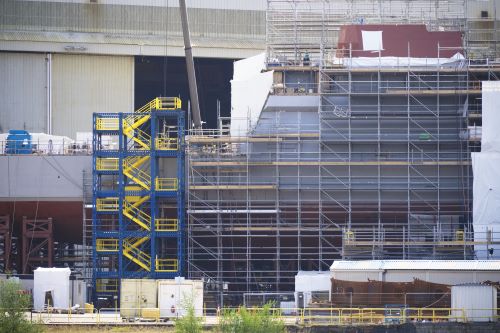Metals Used in Shipbuilding
Shipbuilding is a complex process involving numerous raw materials and a fleet of talented fabricators. It is also a huge and ever-growing industry that can certainly be a stable revenue source for metal fabricators who specialize in crafting ship parts. Let’s look at three metals that are commonly used in shipbuilding:
Steel
Though the art of shipbuilding goes back centuries, it wasn’t until the 1940s that steel became the go-to material for ship construction. Its introduction to the industry was a result of the need for strong, yet fast, ships during World War II. In the years since, steel materials used for building ships were refined to emphasize durability on the open sea and resistance to rust.
Why Is Steel the Primary Material Used in Ship Hull Construction?
Steel stands as the primary material in ship hull construction due to its exceptional strength, durability, and resistance to corrosion in marine environments. These attributes ensure that a ship’s hull can withstand the harsh conditions of the open sea, providing the necessary structural integrity for safe and reliable maritime operations.
Because steel blends impressive strength with malleability, almost every ship that is built today has a hull made of steel. High-tensile steel hulls allow ships to carry enormous weight without capsizing. In addition to the hull, steel is typically used in other structural components of a ship, including bulkheads, gunwales, and masts.
Aluminum Alloy
With a structure made of steel, ships are strong enough to resist damage from constant exposure and contact with the ocean. However, steel is heavy, and too much of it can impact how well a ship stays afloat. For areas of a ship that aren’t in contact with the ocean, aluminum is primarily used. Though not as durable as steel, aluminum is still impressively strong and weighs up to 60 times less. Plus, it is naturally resistant to rust. That’s why, for non-structural ship components, aluminum is popularly used. For instance, equipment, fuel tanks, storage fixtures, and shipping containers are typically made from aluminum.
How Does Aluminum Complement Steel in Shipbuilding?
Aluminum offers a lightweight alternative without compromising strength. Its corrosion resistance and malleability make aluminum suitable for specific components, contributing to reduced overall weight and increased fuel efficiency in certain ship designs.
Brass
Brass is not commonly used in the structure of a ship. It is most often utilized in engines and propellers. Propellers are susceptible to damage from cavitation. Cavitation refers to small bubbles of gas that are generated as the propeller blades spin and create low-pressure points in the water. Though they may seem insignificant, those tiny bubbles all emit minuscule shock waves when they collapse, which can collectively produce enough force to damage the propeller. Brass is naturally resistant to cavitation and can help maximize the lifespan of ship-engine propellers.
In What Other Areas of Ship Engineering is Brass Utilized?
Brass also finds its place in ship engineering in components requiring corrosion resistance and antimicrobial properties. It is commonly utilized in fittings, valves, and decorative elements, adding both functionality and aesthetics to maritime engineering.
Why Are Skilled Metal Fabricators Crucial in the Shipbuilding Industry?
Seafaring vessels have played such a key role in society going back hundreds of years, and they are as important as ever in the modern capitalist world. The shipbuilding industry is booming and always in need of talented metal fabricators to produce quality plates and other parts for building ships.
Skilled metal fabricators play a crucial role in the shipbuilding industry as their expertise ensures precise assembly and welding of complex structures. The intricacies of ship design demand attention to detail, accuracy, and adherence to strict safety standards, making skilled fabricators indispensable for constructing seaworthy vessels.
How Does CNC Plasma Cutting Technology Benefit Metal Fabrication for Shipbuilding?
CNC plasma cutting technology revolutionizes metal fabrication in shipbuilding by offering unparalleled precision and speed. This advanced technology enables the precise cutting of intricate shapes and designs in various metals, enhancing the efficiency of the shipbuilding process. The ability of CNC plasma cutters to handle diverse materials and complex patterns ensures that ship components are fabricated with utmost accuracy, contributing to the overall quality and performance of maritime vessels.
State-of-the-Art CNC Plasma Cutting Technology
Though the shipbuilding industry is hot, it is also crowded. To grow your custom fabrication shop and get ahead of your competitors, you need the right fabrication equipment for the job. At Machitech, we manufacture state-of-the-art CNC plasma, waterjet, and oxy-fuel cutting tables for metal fabrication. Our solutions are fully customizable and include free and unlimited support for life.
The team at Machitech is standing by to provide the solutions your company needs. Contact us today to learn more.
 English
English  Français
Français 
